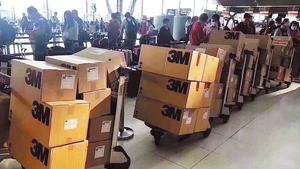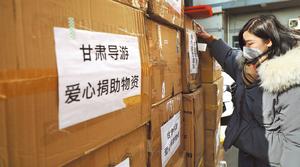Despite its negative impact on Spring Festival travel plans, tourism operators and travel agencies are using their resources to support the fight against the coronavirus outbreak, Yang Feiyue reports.
 Boxes of masks at the Dubai International Airport, waiting to be brought to China by Chinese tour guides and travelers on Jan 25. (PHOTO PROVIDED TO CHINA DAILY)
Boxes of masks at the Dubai International Airport, waiting to be brought to China by Chinese tour guides and travelers on Jan 25. (PHOTO PROVIDED TO CHINA DAILY)
Liu Chaohui has kept a close watch on her WeChat account since news came out about the coronavirus outbreak.
Once someone sends a message seeking help to deliver medical goods that are purchased abroad, Liu goes out of her way to find channels for them to reach domestic hospitals.
"I know many people, tour operators and guides, in other countries," says Liu, who runs a customized outbound tour service in Chengdu, capital of Sichuan province in southwestern China.
We saw many tour operators like us doing the same thing (for donation), all on their own initiative
Liu Chaohui, tour operator from Chengdu, Sichuan province
Once the delivery route matches those people's travel schedule, the 48-year-old can match up relevant parties and set up the arrangement.
She says it's easier and quicker this way, saving time on customs clearance process.
Hubei province, the epicenter of the outbreak, has been in short supply of protective medical items, such as protective clothing and gauze masks.
People have been seen snatching up protective medical products at drugstores across the country, emptying shelves almost as quickly as they are filled.
The Hubei government has been asking for support with medical supplies at various levels, including nongovernmental donations.
"We saw many tour operators like us doing the same thing (for donation), all on their own initiative," Liu says.
To date, she has helped deliver medical goods to Hubei, Guangdong, Chongqing and Sichuan.
For instance, Liu helped a British donor to send 1,000 medical-grade masks and 1,000 sets of protective overalls to hospitals in Guangzhou, Guangdong province, and she took up some delivery requests from donors in Moscow, Russia.
Liu has also received occasional calls for help from hospitals.
"Once I posted the information online, it's all hands on deck," Liu says.
As the outbreak is affecting the country's tourism industry during the Spring Festival holiday, many tourism service providers are joining the army of volunteers contributing to medical relief efforts in epidemic-stricken areas in China.
 Tour guide Lu Yongxian counts the number of medical face masks arrived from Nha Trang, Vietnam to Lanzhou, Guansu province, on Jan 30. More than 500 tour guides and overseas Chinese in Vietnam, Thailand and Malaysia volunteered to buy 46 trunks of 89,000 medical face masks to donate to hospitals in Lanzhou to fight the coronavirus epidemic. (ZHANG RUI / XINHUA)
Tour guide Lu Yongxian counts the number of medical face masks arrived from Nha Trang, Vietnam to Lanzhou, Guansu province, on Jan 30. More than 500 tour guides and overseas Chinese in Vietnam, Thailand and Malaysia volunteered to buy 46 trunks of 89,000 medical face masks to donate to hospitals in Lanzhou to fight the coronavirus epidemic. (ZHANG RUI / XINHUA)
Wan Shan was traveling in India when she heard about the virus.
She arrived in Kolkata on Jan 23 with her friends.
"We decided to purchase some gauze masks after seeing that there was short supply of them at home," says the 28-year-old, who works for the Beijing-based travel operator Utour Group.
As the price of the masks began to increase, Wan began to receive calls for help from domestic hospitals.
"That was when we found it was increasingly hard to get a mask here," Wan says.
Wan and her friends canceled the rest of their plans and traveled to Varanasi, Agra and Delhi, trying to get their hands on a supply of the masks.
Each of Wan's team dug into their own pockets and spent several thousand yuan on masks for those in need back home.
Wan says that seeing doctors struggling to fight the virus while looking after the patients, despite being ill-equipped, fueled the group to talk with mask manufacturers in India about bulk orders and to help deal with such problems as currency exchange and contract signing.
Like Liu, Wan would then contact people going to China to help carry the masks back.
"It's hard, but everyone is still holding on," Wan says.
Some volunteers have chosen to send goods directly to hospitals, especially after news of the delays in managing and distributing donated medical supplies at Hubei's branch of the Red Cross Society.
The charity apologized, following online criticism against its inefficient and unfair allocation of medical supplies in late January.
In a statement on Jan 31, the charity said that the 36,000 surgical masks given to the hospitals with no infected patients are model KN95, which is suitable for everyday protection but cannot be used by medical staff on the front-line, but admitted the organization had management problems.
It said on its website that it has convened an emergency meeting to discuss the problems involving distribution, and pledged to hold accountable the people directly in charge and exercise more caution over the task.
The outbreak has forced many Chinese to cancel trips and stay at home during the holiday.
China received 415 million tourist visits during last year's Spring Festival (Feb 4-10), up 7.6 percent as compared with the same period in 2018, the China Tourism Academy reports.
Tourism income reached 513.9 billion yuan (US$74.1 billion), up 8.2 percent.
About 6.3 million Chinese travelers made outbound trips during the 2019 Spring Festival holiday, according to the academy.
Liu says she was somewhat fortunate compared to her business counterparts, because many of her guests chose to travel after March.
She was busy answering her clients' phone calls about trip rescheduling and cancellations days before the Spring Festival holiday this year.
"We were not very optimistic after hearing about the Wuhan pneumonia at the end of December," Liu says.
"Hoping for the best, we had moved on with our business, and flights and hotels were all booked (for our customers)."
Then, the Ministry of Culture and Tourism ordered travel agencies nationwide to suspend group tours and solo travel services that cover flight tickets and hotels on Jan 24.
"It was all worse than what we had expected," Liu says.
Fortunately, most of Liu's customers were quite understanding and agreed to accept the cancellations or to reschedule their trips.
"Most of them can see the big picture and are calm and rational," Liu says.
At the moment, more than 90 airliners have agreed to fully refund passengers' canceled tickets, but Liu says hotel costs might be irrevocable.
She's still waiting for a reply from her business partners in outbound destinations.
In addition to all the preparations her company made for customers, Liu says she probably would still lose some of her clientele to big travel agencies.
Some popular Chinese travel-service providers have offered full refund for travelers. Ctrip, for example, has refunded all those who booked trips departing between Jan 28 and Feb 29.
At the moment, Liu says she just hopes the virus situation will be resolved as soon as possible, so that everything can go back to normal.
A considerable number of her customers, though, haven't canceled, including Japanese tours in March, European excursions in April and trips to Morocco in May. Liu believes things will get better eventually.
Speaking about her future plans, Liu says she will put in more time to better understand the needs of her customers and develop better products.
She is also on the way to becoming a future tour supplier for Ctrip.
"It will open the door to more potential customers and allow me to share the risk," Liu says.
Contact the writer at yangfeiyue@chinadaily.com.cn


